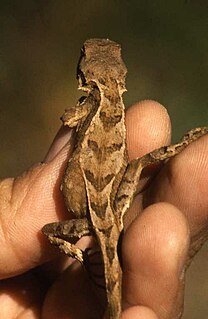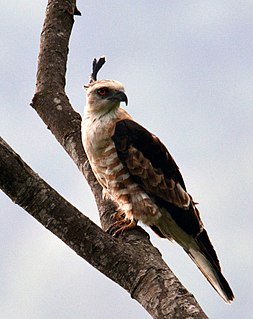
Japalura is a genus of lizards in the family Agamidae. Species of Japalura are native to Pakistan, India, China, and Myanmar. Many species have been moved to the genus Diploderma.
Pseudocalotes is a genus of agamid lizards endemic to Southeast Asia.

John Anderson was a Scottish anatomist and zoologist who worked in India as the curator of the Indian Museum, Calcutta.
Japalura andersoniana, Anderson's mountain lizard, is a species of lizard in the family Agamidae. The species is native to southern Asia.

Japalura major is an agamid lizard found in northern India and Nepal. It lives at elevations up to 2,600 metres (8,500 ft).
The smooth-scaled mountain lizard is an agamid lizard found in Myanmar and northeast India.

Japalura tricarinata is a species of agamid lizard endemic to Asia.

Jerdon's baza is a moderate sized brown hawk with a thin white-tipped black crest usually held erect. It is found in South-east Asia. It inhabits foothills in the terai and is rarer in evergreen forests and tea estates.

Spilosoma sagittifera is a species of moth of the family Erebidae. It was described by Frederic Moore in 1888. It is found in India, Nepal, China and Taiwan.
The Andaman cobra or Andaman spitting cobra is a species of cobra endemic to the Andaman Islands of India. They are fairly widespread in the Andaman Islands. The name of this cobra comes from the Islands itself. It is perhaps the Naja to have the smallest known geographic range of any Asiatic cobras. It is venomous and also has the ability to spit its venom, altough not as fairly well as other asian spitting cobras.
Elachista sagittifera is a moth in the family Elachistidae. It was described by Alfred Philpott in 1927. It is found in New Zealand.

Diploderma swinhonis, also known commonly as the Taiwan japalure, Swinhoe's japalure, Swinhoe's lizard, and Swinhoe's tree lizard, is a species of lizard in the family Agamidae. The species is native to Taiwan.

Diploderma polygonatum, also known as Ryukyu japalure and Okinawa tree lizard, is a species of lizard found in the Ryukyu Islands and Taiwan. It is diurnal and arboreal. An adult male Diploderma polygonatum measures "61 mm. from snout to vent, and 152 mm. from vent to tip of tail; total length 213 mm." The splenial of this lizard is short, as is that of Trapelus agilis.
Diploderma luei is a species of lizard in the family Agamidae. The species is endemic to Taiwan.
Japalura dasi, also known as the Agaupani mountain lizard or Agaupani forest agama, is a species of lizard in the family Agamidae. It is listed as data deficient by the International Union for Conservation of Nature.
Diploderma vela, also known as sail mountain lizard or sail japalura, is a species of lizard endemic to China. It can be found in Tibet and Yunnan at elevations of 2370 meters.
Ota's mountain lizard is a species of lizard in the family Agamidae. The species is native to Southern Asia.
Diploderma zhaoermii is a species of lizard in the family Agamidae. The species is endemic to Sichuan, China.
Cristidorsa is a genus of lizards in the family Agamidae native to India and Myanmar. The name Cristidorsa is Latin for "ridged dorsum", in reference to the ridges on the backs of lizards in this genus. The common name ridged dragons was suggested by the authors of the 2018 genus description.

Diploderma is a genus of lizards in the family Agamidae. Species of Diploderma are native to Myanmar, China, Vietnam, Taiwan, and Japan. Most of the species are found in China, including many endemics.






